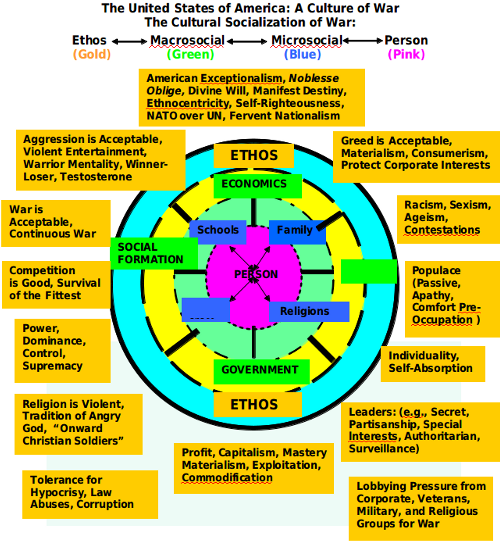Lexicon of War
TRANSCEND MEMBERS, 15 Oct 2012
Anthony J. Marsella, Ph.D. – TRANSCEND Media Service
October 11, 2012 – A few days ago, overwhelmed by the endless violence and wars in our world, I wrote a brief and simple email to a number of listservs where I listed a number of different adjectives preceding the word “war.” I did this somewhat impulsively as a catharsis for my own angst and anger at the fact that “wars” and violence had become commonplace that they were part of our daily vernacular and popular culture. We had come to the place that virtually any conflict or disagreement could be labeled a “war.”
I stated that I was concerned the extensive number and widespread use of adjectives preceding the word “war” would somehow make us immune to its meaning – its horrible and tragic meaning. As a result, we would find ourselves accustomed to its use and habituated to its subtle and apparent significance. I felt that under these circumstances, national policies and decisions regarding war could be pursued without a full recognition of consequences. It is easy to start a war, and difficult to end it. It can become a reflexive response amidst any contention, precisely at the time when other solutions should be pursued.
I added with some degree of cynicism that there were even “futile wars.” And I noted that this term seems to have escaped the vocabulary of our politicians. I published an article a few years ago on the United States as a “culture of war, that was based on the notion that a cultural ethos can develop that socializes war as a way of life. I have attached a figure from this article that captures the complexity of this process as we go back and forth among ethos, macrosocial institutions, microsocial institutions, and individual levels of organization.
Well, in the brief email where I listed the different kinds of war, I added a request to readers to make any additions they felt were appropriate. I expected only a few. But, in fact, the email brought many replies that both suggested additions and that acknowledged the implications of the emerging “lexicon of wars.” Thus I share with you now, an updated and more comprehensive lexicon of wars.
I must admit, as I gathered the terms, I found myself “shocked” by the widespread use of the word “war.” Was it possible that within the context of our global era and its increased inter-dependencies we had come to find the tensions of competition for comfort, resources, and survival itself to push us toward “wars” at all levels. A “versus” mentality had arisen that was pitting different people, organizations, nations, and products against one another in a win-lose arena. The tragedy of this situation is that there are never winners and losers in any war, only casualties and legacies of anger and revenge.
Table 1:
Lexicon of Wars
biological wars,
border wars
cab wars
cancer wars
civil wars,
cold wars
colonial wars
communication wars
corporate wars,
culture wars,
cyber wars,
diet wars
drug wars
ethnic wars
family wars
financial wars,
food wars
gang wars
gas wars
gasoline wars,
girl wars
global wars
happy wars
holy wars
hot wars
ideological wars
just wars (jus ad bellum)
language wars
low-intensity wars
media wars
neighbor wars
nuclear wars
oil wars
parking wars
pizza wars
price wars
product wars,
race wars
regional wars,
religious wars
restaurant wars
secret wars
shadow wars,
star wars
tribal wars
war to end war
wars against terrorism,
wars on poverty,
wars to end all wars
water wars
whale wars
word wars
world wars
And so, voilà, a lexicon of wars, and a figure (below) that suggests a socialization process that may keep us joined to a “futile” process in which competition is not an evolutionary necessity, as promulgated by social Darwinism, but rather an outcome of continued asymmetries in power, wealth, and equality.
A special thank you to all who contributed additions. They are noted in bold print.

From: Marsella, A.J. (2011). The United States of America: “A Culture of War.”
International Journal of Intercultural Relations, 35, 714-728
_____________________
Anthony Marsella, member of TRANSCEND, is a past president of Psychologists for Social Responsibility, emeritus professor of psychology at the University of Hawaii, and past director of the World Health Organization Psychiatric Research Center in Honolulu. He is known nationally and internationally as a pioneer figure in the study of culture and psychopathology who challenged the ethnocentrism and racial biases of many assumptions, theories, and practices in psychology and psychiatry. In more recent years, he has been writing and lecturing on peace and social justice. He has published 15 edited books, and more than 250 articles, chapters, book reviews, and and popular pieces. He can be reached at marsella@hawaii.edu.
This article originally appeared on Transcend Media Service (TMS) on 15 Oct 2012.
Anticopyright: Editorials and articles originated on TMS may be freely reprinted, disseminated, translated and used as background material, provided an acknowledgement and link to the source, TMS: Lexicon of War, is included. Thank you.
If you enjoyed this article, please donate to TMS to join the growing list of TMS Supporters.

This work is licensed under a CC BY-NC 4.0 License.